




Un Periódico Diferente / A Different Kind of Newspaper September 2023 Volume 19 No. 10 Verano Musical
2023
contents
2 Foto del Mes /Photo of the Month Reconocen a las educadoras
Dra. Aida Oquendo y Nilda Guzmán durante las Fiestas Patronales de Holyoke 2023

3 Portada / Front Page
New England Latino Festival 2023 • Springfield
4 ¡Segundo BomPlenazo! • Springfield, MA
5 Fiestas Patronales de Holyoke 2023

6 CUNY Dominican Studies Institute Receives Historic $1.5M NSF Grant
7 Opinion / Opinion
Unraveling Poverty and the Well-being of Children
8 Ruthie Is Here For Us!
9 Educación / Education
Tuna de la UPR es Premiada en Festival Internacional Celebrado en México STCC Manufacturing Program adds 3D Printing to Curriculum
10 US music education has a history of anti-Blackness that is finally being confronted
11 Política / Politics
César Ruíz Launches Political Action Committee
12 Cultura / Culture
Acuerdo para Crear la Biblioteca Digital de Puerto Rico
14 Libros / Books
Cómo ocultar un imperio: Historia de las colonias de ESTADOS UNIDOS
Whose America? U.S. Immigration Policy since 1980
15 Finanzas / Finances
Relieving or Reliving Credit Card Debt
Salud / Health
Inauguran las Nuevas Oficinas del Latino Counseling Center en Springfield
16 Deportes / Sports
Puerto Rico y República Dominicana 2023
Holyoke Old Timers Softball League
Founded in 2004 Volume 19, No. 10 September 2023
Editor Manuel Frau Ramos manuelfrau@gmail.com
413-320-3826
Assistant Editor Ingrid Estrany-Frau
Art Director Tennessee Media Design

Business Address El Sol Latino P.O Box 572 Amherst, MA 01004-0572
Editorial Policy
El Sol Latino acepta colaboraciones tanto en español como en inglés. Nos comprometemos a examinarlas, pero no necesariamente a publicarlas. Nos reservamos el derecho de editar los textos y hacer correcciones por razones de espacio y/o estilo. Las colaboraciones pueden ser enviadas a nuestra dirección postal o a través de correo electrónico a: info@elsollatino.net.
El Sol Latino welcomes submissions in either English or Spanish. We consider and review all submissions but reserve the right to not publish them. We reserve the right to edit texts and make corrections for reasons of space and/or style. Submissions may be sent to our postal address or via electronic mail to: info@elsollatino.net.
El Sol Latino is published monthly by Coquí Media Group. El Sol Latino es publicado mensualmente por Coquí Media Group, P.O Box 572, Amherst, MA 01004-0572.
2
Publish your bilingual ad in El Sol Latino! Call us today at (413) 320-3826. Foto del Mes /Photo of the Month Reconocen a las educadoras Dra. Aida Oquendo y Nilda Guzmán durante las Fiestas Patronales de Holyoke 2023
El alcalde de Holyoke, Joshua A. García y la Dra, Aida L. Oquendo
El alcalde de Holyoke, Joshua A. García y Nilda Guzmán


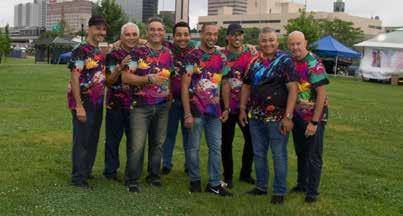

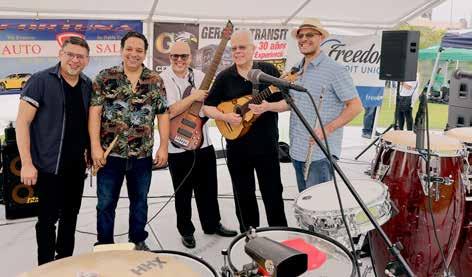


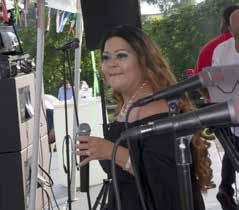

Portada / Front Page 3 El Sol Latino September 2023
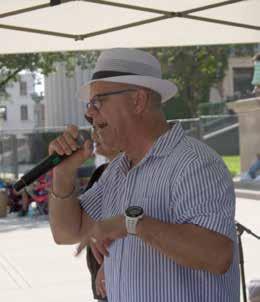
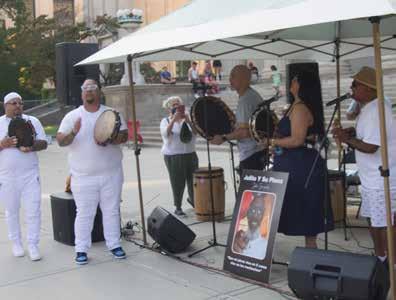
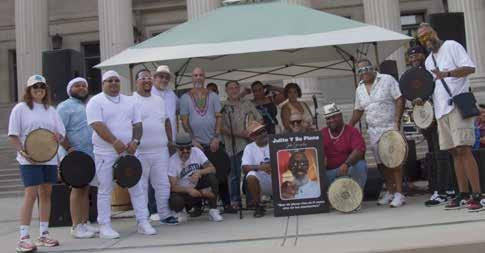





Portada / Front Page 4 El Sol Latino September 2023








5 El Sol Latino September 2023
Portada / Front Page
NEW YORK, NY | CUNY DOMINICAN STUDIES INSTITUTE |
Augsut 21, 2023 - Backed by a $1.5 million grant from the National Science Foundation (NSF), the CUNY Dominican Studies Institute (DSI) based at The City College of New York is going beyond its core mission of research and scholarship and now aims to improve the recruitment, retention, and graduation rates of Latino/a/x students in STEM programs.
The grant from the NSF’s Hispanic Serving Institution (HSI) Program, is part of a $3 million largesse to be shared equally between CUNY DSI and the Institute for Study of “Race” & Social Justice of the University of New Mexico (UNM). The funding will support the creation of resource hubs at both CCNY and UNM to serve Hispanic Serving Institutions (HSIs) across the nation under the leadership of CUNY and UNM.
“Over the next five years CUNY DSI will work to advance equity and student success in STEM by creating a hub centering intersectionality as inquiry and praxis and serving as a connector, and a resource for all who are interested in advancing equity and student success in STEM,” said Dr. Ramona Hernandez, Director, CUNY DSI.
The future depends on a well-developed and robust scientific workforce, Hernandez added. However, millions of underserved students are underrepresented in these fields. “Students of Latino/a/x ancestry are underrepresented in the STEM fields, despite the fact that the Government and other institutions have allocated funding to address the disparity. Our proposal calls for the use of different lenses, different view to understand and to develop programs that are tailored to the specific needs of Latino/a/x students.”
She noted that the grant opens up a line of scientific research inquiry that departs from perceiving Latino/a/x students not as a homogenous group, but as a people who represent different national/ethnic origins and as such, embody specific life experience and historical legacy.
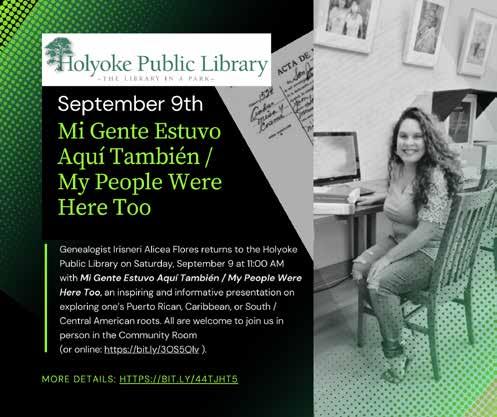
“Diversification of STEM is an essential endeavor for us all,” said Tony Liss, CCNY Provost. “The intersectional approach championed by Dr. Hernandez’s grant holds great promise for identifying and lowering the barriers faced by Latino/a/x students interested in the STEM fields. We need them badly and I’m grateful for the help the NSF is providing as we work to address these issues.”
For this grant, Hernandez partnered with Yoel Rodriguez, Department of Natural Sciences at Hostos Community College and Maria-Isabel Roldos-Prosser, Director of the CUNY Institute of Health Equity at Lehman College. The team will work in collaboration to address and dismantle the barriers
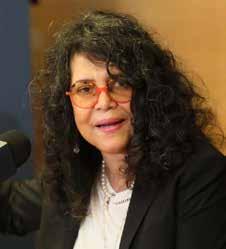
that prevent Latino/a/x students from achieving higher success in the STEM fields. The project, entitled “Collaborative Research: HSIHubs: Intersectionality as Inquiry & Praxis: Race, Class, Gender & Ethnicity for Student Success in STEM” aims to:
equity in admissions, enrollment, retention, degrees awarded, and post degree outcomes;
faculty fellows and other stakeholders across project sites in order to share and learn about equity initiatives that have been implemented in other institutions and develop action plans for home institutions; and
communication strategies, and publications.
In the end, researchers will develop a framework for how to advance equity in STEM education for all underserved student populations through a collaboration that examines the experience of students in colleges and universities in the two different geographic regions.
Since 1847, The City College of New York has provided a highquality and affordable education to generations of New Yorkers in a wide variety of disciplines. CCNY embraces its position at the forefront of social change. It is ranked #1 by the Harvard-based Opportunity Insights out of 369 selective public colleges in the United States on the overall mobility index. This measure reflects both access and outcomes, representing the likelihood that a student at CCNY can move up two or more income quintiles. Education research organization Degree Choices ranks CCNY #1 nationally among universities for economic return on investment. In addition, the Center for World University Rankings places CCNY in the top 1.8% of universities worldwide in terms of academic excellence.
Portada / Front Page 6 El Sol Latino September 2023
Ramona Hernández, CUNY DSI director.
This is the second in a series of guest opinions offered by two brothers who discuss the well-being of children and families and identify problems faced by them. There are countless, oppressive challenged faced by our community; however, there are heroic partners who develop solutions to keep children safe from unintentional harm. The series of guest opinions central theme offer reflections on solutions for fostering inclusion and equity in the Latina/o family in the larger community. This guest opinion shares insight regarding three concerns: 1) secure family up-bringing; 2) impact of housing; and 3) food confidence.
When we were growing boys, during the 1950s-1960s, our parents and community provided a moral grammar with which we discussed the common meaning of poverty in our lives and the lives of our neighbors. While some individuals were able to reach their full potential for growth and development, that was not always the case. Immediately after returning from military service during World War II, a young ambitious man, our father, married our mother. Our family did not achieve a prosperous life. Our parents bore six children in seven and a half years. We recall difficulties of growing up that did not reflect the accepted narratives disseminated about post war prosperity. Our parents struggled to provide the advantages other children had around the neighborhood. When we went to school, there was not a nickel to purchase milk to go with our lunch from home.


Though we lived in a modest home purchased through the G.I. loan benefit, we simply lacked important financial resources for other necessities. While economic hardship had nothing to do with the love we were generously provided, it did impact the food options we had available to us. However, we did have next door neighbors who had it worse than we did, at least the children did. We do not believe their father earned less than our father but how the children were treated was a horrible contrast to how our parents treated us. Those other children wandered around their home and the neighborhood dirty and hungry. Unbelievable as it seems, their parents would padlock the refrigerator, a sign of persistent neglect by their parents and suffering of those children. So, no matter how poor we were, we knew how lucky we had it in comparison to some. To be sure that truth was made clear, because each time we crossed the border to go shopping in Juarez, Mexico, we encountered young children on the street begging. Both, our neighbor’s children or our children who live just across the border, were simply looking for a bit of security, a safe place to sleep and enough food to nourish young bodies. Our parents worked hard; our father almost always held two jobs (and sometimes three) while our mother devoted herself to the care
by MIGUEL L. ARCE and JOSÉ P. ARCE
of the children. She sewed all our clothes, patched all the inevitable rips and tears, cleaned the house and cooked all meals and comforted her children when needed, which was often. They both would help us with homework though neither completed high school. It is hard for us to imagine how any parents could be prouder as all six of their children earned a college diploma. These educational attainments might be in part because we had the stability of a permanent home where we grew up and matured, though it did not resolve the issues related to inadequate financial resources. Despite the food insecurity and attendant financial struggles, the Arce children, under the guidance of steady and hardworking parents grew up with a stable identity and a confident sense of standing in the world.
Over sixty years ago, the War on Poverty was initiated by President Lyndon Johnson; during the decade of the 1960s described above. “In his first State of the Union address in January 1964, President Lyndon B. Johnson asked Congress to declare an ‘unconditional war on poverty’ and to aim ‘not only to relieve the symptom of poverty, but to cure it and, above all, to prevent it.’” (Bailey,2014). Despite this most ambitious domestic policy initiative, public policies were not designed to deal with the persistent economic inequality existing in all sectors of society. Children were/are vulnerable to the harsh economic realities of being born poor. Childhood poverty is a public policy shortcoming with devastating impacts on the children and families who experience it. This problem means our leaders have, again, undeniably chosen to allow millions of children to endure homelessness, missed meals, have inadequate clothing (which is especially apparent when you see children walking to school in the harsh winters), and countless other tangible and intangible hardships. We sadly report that the gap between those who have too much and those who have too few resources to overcome hunger continues to exist and is cruelly growing.
Educational attainment has long been the hallmark of opportunity in our society. Yet, a growing population of parents is facing new and unique barriers to benefiting from that system. Parents are not provided with the tools for self-sufficiency to confront issues of hunger and homelessness. Education’s mission should be to promote liberation of the mind, body and spirit, promote social bonds and increase self-sufficiency. Currently, the system largely enslaves people. Hunger pains are faced by millions of people who are simply trying to find necessary food resources. More and more frequently, we see homeless men and women cross in the street who are simply trying to gain a decent, secure and affordable place to stay. Millions are simply attempting daily to survive. It is hard to see how hard they struggle.
continued on next page
7 El Sol Latino September 2023 Opinion / Opinion
by DAVID YOS
It is impossible to express how thrilled I was to find out my good friend Ruth Garcia is running for City Council in Ward Four. This is a particularly heartfelt endorsement for me because, while admittedly I have on occasion favored one candidate over the other simply because I found him or her marginally better, with Ruthie there is no comparison to anyone else. She is a woman of exceptional character, strong character, whose heart is truly with our community. Ruthie says, “ I’m here to represent everyone, whether or not he votes for me, and no matter what he thinks about me.” There are not many in politics like that.
Some are fortunate enough to have a relatively easy path in life, and due to their (publicly, at least) unblemished records are held in high esteem: but I have the greater admiration for those (including in my own family) who have overcome, or really must continue to overcome, adversity. And while Ruthie has had her share of successes – such as in home health care management, where she has been instrumental in building the operations of several companies in this region from the ground up to $10’s millions in revenue, and has been behind the successful electoral campaigns of so many others – it is no secret she has suffered deep humiliations, been on the receiving end of a lot of bad stuff, for which some will always look down on her. However, I prefer to look at the strength of a person’s character, regardless of circumstances, and her efforts to progress toward all she is capable of; Ruthie excels on both counts. Also, I have a special respect for those who, notwithstanding all along having good intentions, have the courage to admit having mistakenly followed others whose actual interests, despite their purported ones for the community, are much more self-serving; who, not only that, want to work to right that wrong. Ruthie is exactly that. She is a long-time personal friend with whom I remained on opposite sides politically as recently as 2021 (when she was extremely effective for
them here in Holyoke, as it happens), but whom now I am very honored to work with. Of course the very dark side to this is that such people draw the deep animosity of their former associates, and are specially targeted.
While I am pleased that Ruthie is looking at the prospect of becoming a city councilor with the greatest humility, and although some are questioning her qualifications, to me the important part is not the technical knowledge (although she has been attending a lot of meetings and learning about the council’s workings), but being there for the people; being engaged with the residents, and voting as they would with the benefit of more detailed information. It is also essential for good government that councilors exercise independence (as Ruthie certainly does) rather than be rubber stamps, as a mayor might like. Because a mayor needs councilors’ votes they can have influence over him to budget more cost-effectively, and place residents’ priorities above his personal ones.
Ruthie is to be commended for persevering through this long campaign season; even at the local level the time commitment required to run for office requires much sacrifice from someone working an hourly job to support her family. What compounds the problem is that whereas those willing to serve other interests are provided with plenty of resources, those who want to serve the people must search for them on their own.
Even though I reside in a different ward I am doing what I can to help with Ruthie’s campaign, and encourage you to do the same; good councilors benefit our entire city, whether elected from a particular ward or at-large. And of course I ask all the good people of Ward Four who believe in our community to vote for Ruthie this November 7 (or during early voting).
Sincerely,
David Yos Holyoke Resident & Small-Business Owner
continued from page 7
The connection between poverty and child and family welfare has been documented in innumerable studies. Ensuring economic stability for all families can serve as a preventative strategy. Family income allows individuals to meet and surpass basic needs. Asset building plans work, for example, housing matters a great deal. Housing is a way of passing on wealth intergenerationally. Putting money into the pockets of struggling families means more children will have what they need to thrive: to play, to learn and to grow with confidence. It means more children experiencing a school day without hunger and an increasing number of families feeling safe and secure in a place they can call home. In 2023, the challenges of feeding and housing children and their families have grown. In
2023, American families are on trial for being poor. Our society is fractured and we blame the victim. Providing permanent residences for the unhoused populations remains an ongoing urgent challenge.
Nevertheless, people are stepping up, in partnership, to identify and implement solutions. They have a shared purpose to prevent the injustices of homelessness and hunger. It is for such people, and to inspire others, that we are encouraging, people to gather at the Fostering Inclusion and Equity for Latina/o Children and Families
Wellbeing conference scheduled for March 13, 2024 at Springfield College. United in heart and spirit, we will become a whirlwind blowing away all obstacles impeding constructive community change. Our children deserve strong, passionate advocates fighting for them.
8 El Sol Latino September 2023 Opinion / Opinion
Educación / Education
RÍO PIEDRAS, PR | UNIVERSIDAD DE PUERTO RICO | 8 de agosto de 2023 – Como resultado de su reciente participación en el XI Festival Internacional de Tunas y Estudiantinas en San Luis Potosí en México, la Tuna de la Universidad de Puerto Rico obtuvo premios en dos categorías, Mejor Tema Libre y Mejor Baile de Capa.
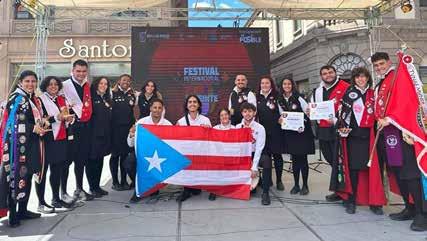
Con la canción Puerto Rico y su cultura, interpretada por Alejandra González Feliciano y escrita por la directora de la Tuna Edithmarie Claudio Cruz, la agrupación obtuvo el premio de Mejor Tema Libre. Además, cargaron con el galardón en la categoría Mejor Baile de Capa, el cual fue presentado por Adriana Rodríguez, única mujer en la competencia en esta categoría.
Esta fue la primera vez que la Tuna se presenta en este festival en México -que tuvo lugar del 4 al 6 de agosto pasado- y la oportunidad surgió, por haber ganado el ‘Premio al Sentir Tuneril’ en el Festival Departamental de Tunas 2022 en La Vega, Colombia, que otorga la Tuna Navarra.
“Para mí, como directora, es una gran responsabilidad y orgullo llevar nuestra Tuna, nuestro país, nuestra universidad y nuestra música puertorriqueña a lugares que no conocemos. Poder ir a México, más que un logro es un momento histórico que vivimos y compartimos con más de 20 tunas mexicanas y colombianas”, expresó Claudio Cruz. “La Tuna UPR soñó con tocar en tierras mexicanas y se ganó este boleto cuando menos lo esperaba”, añadió.
Por su parte, la rectora del Recinto de Río Piedras de la UPR, Angélica Varela Llavona, felicitó a los integrantes de la agrupación universitaria “a nombre de todos los que formamos parte de la comunidad universitaria del Recinto de Río Piedras felicita a nuestra Tuna por su excelente representación en México. Son ustedes motivo de nuestro orgullo. ¡Aúpa Tuna!”.
La Tuna de la Universidad de Puerto Rico se fundó en 1961 por la profesora Norma Urrutia de Campo, por lo que es considerada la tuna mixta más antigua del continente americano con actividad continuada y la primera tuna de Puerto Rico. A lo largo de su trayectoria musical y tuneril, esta agrupación estudiantil ha realizado un sinnúmero de viajes alrededor del mundo dejando su huella en Europa, Sudamérica, Norteamérica y el Caribe, y estableciendo lazos de hermandad con la Tuna Universitaria de la Universidad de Antofagasta, la Tuna Piura de Perú y la Tuna Universitaria de Santander de España. Además, cuentan con seis producciones discográficas.
SPRINGFIELD, MA | SPRINGFIELD TECHNICAL COMMUNITY COLLEGE |

August 18, 2023 – In a landmark move for community colleges in Massachusetts, Gov. Maura Healey signed a budget which includes several provisions that expand educational access to new populations while continuing support for programs that have been crucial in retaining current students. The fiscal 2024 budget includes several key investments that are poised to make a transformative impact on students of Springfield Technical Community College. The numbers below represent the total funding to all community colleges. STCC’s portion will be determined in the near future. Some of the highlighted provisions in the 2024 budget include:
1. MassReconnect: Under MassReconnect, Massachusetts has allocated $20 million to support “free” community college for adults aged 25 or older. This groundbreaking program will provide “last dollar” support for these students, which includes coverage for expenses outside of tuition.
2. Capacity-Building for Free Community College: $12 million has been allocated to support capacity-building efforts aimed at exploring the “Free Community College For All” initiative, which could expand the free community college program from 25 or older to all ages.
3. Nursing Student Scholarships and Faculty Support: The budget includes $18 million to provide scholarships for community college nursing students. These funds can also be used to bolster the recruitment and retention of nursing faculty. Additionally, in another provision, the state will be expanding the eligibility of clinical or skills lab faculty to include nursing professionals with a bachelor’s degree, provided they meet other minimum requirements.
4. In-State Tuition for Undocumented Students: Reflecting a commitment to inclusivity, the budget extends in-state tuition eligibility to undocumented immigrant students.
5. Continued Support for Student Success: The budget allocates $14 million to the SUCCESS (Supporting Urgent Community College Equity through Student Services) initiative. These funds support key positions
and initiatives at STCC, including the Lead (Lead Female Leadership & Mentoring Program) and MILE (Male Initiative for Leadership and Education) programs.
“Massachusetts’ investment in education, especially community colleges, will have a far-reaching impact on individuals and our region as a whole,” said John B. Cook, President of Springfield Technical Community College. “We are excited to embrace these initiatives, collaborate with partners and continue providing top-quality education that empowers our students to transform their lives.”
The SUCCESS initiative and related funding has led to increased programming, academic engagement and wraparound support for STCC students, said Vice President for Student Affairs Darcey Kemp.
“SUCCESS has been a key driver for our retention and persistence efforts over the past three years,” Kemp said. “Some of our signature programs are born from SUCCESS, such as Lead and MILE. These programs have produced students who have fully embraced the collegiate experience, strengthening their purpose and growing their leadership capabilities. The programs have motivated them to achieve their academic and personal goals.”
On the investments in nursing programs at STCC and across the state, STCC School of Health and Patient Simulation Dean Christopher Scott sees some relief for area healthcare institutions.
“Nursing has always been one of our most successful and popular programs,” Scott said. “With this grant, we’ll be able to build capacity, increase our enrollment cap, and answer healthcare organizations that have been clamoring for more nursing talent.”
Interested in applying to STCC? Visit stcc.edu/apply or call Admissions at (413) 755-3333.
9 El Sol Latino September 2023
Education
by PHILIP EWELL
This piece originally appeared on theconversationo.com | June 28, 2023
When it comes to achieving racial diversity, music education at the university level in the U.S. still has a long way to go. One of the leading professional organizations, the Society for Music Theory, put it bluntly in 2020: “We humbly acknowledge that we have much work to do to dismantle the whiteness and systemic racism that deeply shape our discipline,” the group wrote.
The focus on white, male Europeans in textbooks and music selected for study has been called into question by countless scholars and practitioners because of music education’s deep roots in anti-Blackness. In recent years, the simplest solution for music professors has been to find nonwhite classical composers and use their work on a program or concert to demonstrate the school’s commitment to diversity. One person whose work some professors have used in such a way is Florence Price. A composer and music teacher who died in 1953, Price is considered to be one of the first Black female musicians with mainstream appeal.
But in my view as one of only a few Black scholars in the field of music theory, such diversity efforts often serve only to reinforce the whiteness and maleness of the system.
Ethnomusicologist Dylan Robinson calls these efforts “additive inclusion” in that they give the impression of making positive change but serve only to maintain an overemphasis on the work of white male Europeans.
Music theory textbooks
In 2020, music theorist Megan Lyons and I did an analysis of the seven most common undergraduate music theory textbooks in the U.S. We wanted to establish a baseline of the racial and gender makeup of the composers represented in the books to see what teachers were offering to our students as the most important music to consider in the undergraduate music major.
Music theory courses, usually spread over four or five semesters, are often considered the most crucial aspect of the major, and theory textbooks are presented as authoritative sources that outline the essentials of the discipline.
Representative titles include “Harmony and Voice Leading,” “Harmony in Context,” “Harmonic Practice in Tonal Music” and “Concise Introduction to Tonal Harmony.”
Looming large in these textbooks is the word “harmony,” the sound that is heard when two or more instruments or voices sound together, though in a global context the term has other meanings as well. What is considered harmony in the U.S. is based on European notions of tonality, pitch, scale, mode, key and melody.
The three composers the books most commonly represented were Germans Johann Sebastian Bach and Ludwig van Beethoven and Austrian Wolfgang Amadeus Mozart.
We found that of the nearly 3,000 musical examples cited in the textbooks, only 49 were written by composers who were not white
and only 68 were written by composers who were not men.
On rare occasions those two subgroups overlapped, as with Florence Price. Only two examples were written by Asian composers.
All told, almost 98% of the musical examples were written by white men who mostly spoke German, and these seven textbooks represented about 96% of the market share.
Left out of textbooks are the many African American musicians who contributed significantly to American music, such as classical composers Nathaniel Dett, James Reese Europe, Julia Perry and Clarence Cameron White.
Also generally excluded were nonclassical genres like jazz, blues or bluegrass, or contemporary popular music such as hip-hop, soul or punk.
Anti-Blackness in music conservatories
American music academies generally reflect the social norms of the day. Anti-Blackness was commonly accepted in all music institutions until well into the 20th century through the eugenics of music pedagogue Carl Seashore, the white supremacy of the composer-pianist John Powell and the racism of music theorist Heinrich Schenker.
In her 2019 master’s thesis “A Message of Inclusion, A History of Exclusion: Racial Injustice at the Peabody Institute,” violinist Sarah Thomas details a common American story of racial angst in higher education.
Thomas focused on the Peabody Institute, founded in 1857 in Baltimore, Maryland and the oldest U.S. music institution, and its board members’ letters about the possible admission of Black pianist Paul Brent.
In July 1949, Peabody President William Marbury wrote the school’s board of directors and reminded board members of the school’s unofficial policy at the time:
“We are brought face to face with the issue whether to modify our longstanding rule against the admission of negro students,” Marbury wrote.
Once the issue was put to a vote, only one board member, Douglas Gordon, openly opposed admitting Brent and cast the one dissenting vote.

“It seems to me that it would be a great mistake to change the present policy,” Gordon wrote. “In our climate the presence of negroes can to some be extremely offensive.”
Though Brent was admitted and became the first Black student to enroll at Peabody, the abhorrent views of Gordon still remain present today in more subtle forms.
The study of jazz is one such example of racial exclusion.
Generally considered a Black musical genre, jazz is now part of most music educational institutions, but is virtually always separate from the mainstream music major.
In a few cases, students are able to major in jazz. But in most cases, if students wants to major in jazz, they must major in classical music while playing jazz on the side.
Change in music education is coming
Citing declining enrollments for music majors across the country, the College Music Society in 2014 published a manifesto for change to the undergraduate music major. It deemphasized music and methods continued on next page
10 El Sol Latino September 2023
Educación /
SPRINGFIEL | HLLNPAC | August 14, 2023 — East Longmeadow businessman Cesar Ruiz, the President and CEO of Golden Years Home Care and a one-time Springfield School Committee member, has announced the launch of the Hispanic Latino Leaders Now Political Action Committee (HLLNPAC).

representative population of residents in Massachusetts that identify as Hispanic or Latino. A further mission of the Political Action Committee is to advance qualified candidates to better represent the electorate and population as a whole.
Ruiz formed the Political Action Committee to advance public policy that reflects the values and addresses issues important to Hispanic and Latino voters in Massachusetts and also to advance Hispanic/ Latino candidates for office throughout the Commonwealth.
The PAC was established with an initial $100,000 personal loan by Ruiz to the new entity, as allowed by the regulations for establishing a political action committee.
The mission of the new Hispanic Latino Leaders Now PAC, according to Ruiz, is to “support our goals and ideals, including, but not limited to, a fair tax code, support of electronic ballot signature legislation and equity and inclusion on statewide committees and appointments.”
Ruiz said, “this new Political Action Committee will also make political campaign contributions and provide support to persons of color running for local, regional and statewide office who will represent the issues of importance and that matter most to Hispanic and Latino voters and populations.”
According to the new website supporting the formation of HLLNPAC, while Hispanics and Latinos are 13% of the population in Massachusetts, they represent a very small proportion of the elected chambers of the State House and Senate. While these proportions slightly have increased on the local level, they still do not rise to the
continued from page 10
of the Western canon while emphasizing the need for students to engage with music from different cultures and with new technologies. This change has taken many forms.
Musicians are rethinking their curricula to treat all music of the world on equal footing as the European standards.
Piano proficiency and European language requirements are being reconsidered – in some cases cast aside – by music institutions. Other schools are creating new music majors for those working with digital sound and sound design, or for those studying popular genres such as blues, rock, metal and country.
Academic work in music is changing as well, and students can now at times get credit for work outside of traditional paper writing.
It’s my belief that the sooner we musicians, irrespective of our own identities, can face up to our racial segregationist past, the sooner we can all reap the benefits of our nation’s unique musical diversity.
PHILIP EWELL is a professor of music theory at Hunter College of
In addition to founding HLLNPAC he is serving on its inaugural Board and as Clerk of the new organization. Ruiz operates Golden Years Home Care, Golden Years Behavioral Health Group and Golden Years Staffing, and is a member of the Board of the Economic Development Council of Western Massachusetts. He is also a cooperator at Monson Savings Bank and from 1980 to 1986 served as an At-Large Member of the Springfield School Committee, becoming the first Latino to be elected in the Commonwealth of Massachusetts.
Ruiz is joined on the PAC Board by Andrew Melendez who currently is the Director of the Latino Economic Development Corporation headquartered in Springfield. That organization connects Latino business organizations to available capital improvement grants and serves as an advocacy group in support of Latino economic development in the Commonwealth.
Melendez formerly served as the Western Massachusetts Director for the Associated Industries of Massachusetts, the largest business association in Massachusetts having over 700 members in the western region.
The Board of the new PAC also includes two other individuals. Lidya Rivera-Early is part of the founding Board and serves as Director of Community Engagement at Springfield Technical Community College. Born in Stamford, Connecticut, Rivera-Early spent part of her childhood in Puerto Rico before moving to Springfield.
Rounding out the Board is Cristina Berrios serves as Office Manager at Golden Years Home Care Services. She handles the coordination of all central office functions at the company including training and staff development.
the City University of New York. His research specialties include race studies in music theory, Russian music theory, Russian opera, modal theory and history, twentieth-century music theory, and hiphop and popular music. As a public music theorist his scholarship has been featured in Adam Neely’s YouTube channel, the BBC, Die Zeit, the New York Times, the New Yorker, and WQXR’s Aria Code, among others. Philip’s monograph, On Music Theory, and Making Music More Welcoming for Everyone, which appeared with the University of Michigan Press’s Music and Social Justice series in Spring 2023, takes an antiracist approach to music education for the twenty-first century. He is also under contract at W. W. Norton to coauthor a new music theory textbook, The Engaged Musician: Theory and Analysis for the Twenty-First Century, which will be a modernized and inclusive textbook based on recent developments in music theory pedagogy, with a projected publication date in 2024. Philip is the editor of the Oxford University Press book series Theorizing African American Music, which launched in Fall 2022. For more information on Philip visit his website, philipewell.com.
11 El Sol Latino September 2023 Política / Politics
Cultura / Culture
SAN JUAN, PR | LA FORTALEZA- OFICINA DEL GOBERNADOR
DE PUERTO RICO | 21 de agosto de 2023 - El gobernador de Puerto Rico, Pedro R. Pierluisi, participó de la firma de un acuerdo con el fin de crear la Biblioteca Digital de Puerto Rico. El proyecto da inicio tras la asignación por parte del primer ejecutivo de $1,080,000.00 proveniente de fondos ARPA y el Rescate Cultural, fase II, así como la alianza entre el Instituto de Cultura Puertorriqueña (ICP), el Tribunal Supremo de Puerro Rico, la Universidad de Puerto Rico de Río Piedras (UPR), el recinto de Ciencias Médicas, y el Ateneo de Puerto Rico.
“Tengo un firme compromiso con la preservación histórica y cultural de Puerto Rico. Gracias a este proyecto, se aspira contar con una selección de más de tres mil publicaciones, accesibles para toda la ciudadanía, cuya primera fase de digitalización incluye libros desde 1788 hasta el 1928. Nuevamente, maximizamos el uso de la tecnología para brindar mayores accesos a nuestra ciudadanía. Agradezco a todos los que lideraron y estarán encargados de desarrollar este proyecto y estén seguros de que continuaré identificando recursos para ampliar el acceso, facilitar el disfrute y aportar al conocimiento mediante la preservación de nuestra historia”, dijo el gobernador.
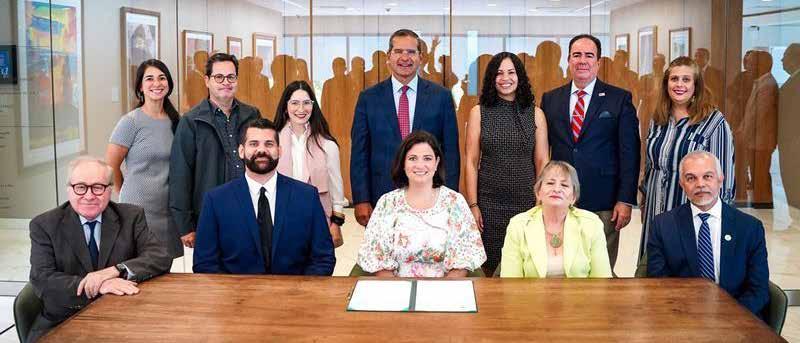
Durante la ceremonia, realizada en la galería del Tribunal Supremo, participaron de la firma del acuerdo la jueza presidenta del Tribunal Supremo de Puerto Rico, Maite D. Oronoz Rodríguez; el director del ICP, Carlos Ruiz Cortés; el rector interino del recinto de Ciencias Médicas de la UPR, Carlos Ortiz Reyes; la rectora del recinto de Río Piedras de la UPR, Angélica Varela Llavona y Marco Antonio Rigau, en representación del Ateneo Puertorriqueño.
“Utilizando la tecnología como herramienta para garantizar el acceso, el Poder Judicial pone a la disposición de toda la ciudadanía el acervo literario y aportaciones académicas que ha compilado la biblioteca del Tribunal Supremo de Puerto Rico a través de toda su historia. Mediante esta colaboración, las personas tendrán a su alcance una
variada y valiosa colección que incluye autoridades jurídicas importantes de todo el mundo, así como una gama de publicaciones sobre temas diversos, cruciales para la función judicial y el intercambio de ideas. Además de su beneficio respecto a la accesibilidad de la información, este acuerdo nos permite trabajar para ser archiveros fieles de nuestra historia jurídica”, indicó la jueza presidenta. Por su parte, el director del ICP expresó que “estamos sumamente orgullosos de haber logrado este acuerdo que dará acceso gratuito a los ciudadanos en Puerto Rico y cualquier parte del mundo a una biblioteca digital con miles de publicaciones de diversos temas. Es un proyecto legado de gran envergadura que nos propusimos hacer realidad para facilitar la selección de textos provistos por estas cinco instituciones custodias, que cuentan con extraordinarios acervos bibliográficos. Con la Biblioteca Digital de Puerto Rico seguimos acercando nuestros servicios a la gente, de una forma fácil y accesible”. El contenido de las publicaciones estará disponible a través de un portal digital custodiado por la BNPR. En el portal se incluirá material de las cinco entidades que formaron parte del acuerdo. Además, se espera poder incluir publicaciones de otras bibliotecas públicas, municipales, comunitarias o universitarias. El proyecto, de carácter colaborativo, busca lograr nuevos acuerdos con más bibliotecas en Puerto Rico para hacer de su contenido uno amplio y diverso. Los materiales serán digitalizados siguiendo las guías federales conocidas como FADGI y se recopilará la información para el repositorio digital con el esquema de metadatos “Dublin Core”. Las bibliotecas participantes proveerán hasta un máximo de 350 libros para ser incluidos en este proyecto.
La Biblioteca de Puerto Rico, adscrita al ICP y líder de la iniciativa, mantiene bajo su custodia sobre 70 mil títulos únicos en diversos formatos con un enfoque en Puerto Rico y el Caribe en las disciplinas humanísticas. Cuenta con colecciones especializadas como: Libros Raros de Puerto Rico, Colección Antiguo Casino, continued on next page
12 El Sol Latino September 2023
Cultura / Culture
Colección Samuel R. Quiñones, Colección Van Dousen, Colección Filipo de Hostos, Colección Dra. Concha Meléndez y Colección Eugenio María de Hostos.
La Biblioteca del Tribunal Supremo de Puerto Rico, perteneciente al Poder Judicial, es una biblioteca especializada en publicaciones jurídicas y su propósito principal es brindar servicio de información rápido, efectivo y actualizado a los tribunales. La prioridad del servicio está dirigida a los jueces, las juezas y sus oficiales jurídicos, así como al resto del personal que labora en el Tribunal. Además, brinda servicio de apoyo a todas las bibliotecas del Poder Judicial, así como a otras agencias del gobierno y al público en general.
Asimismo, la Universidad de Puerto Rico estará representada por su recinto de Río Piedras y el recinto de Ciencias Médicas. Estas entidades educativas acordaron proveer un listado de las publicaciones en la Colección Puertorriqueña en la Biblioteca y Hemeroteca Puertorriqueña y de la Biblioteca Conrado F. Asenjo, respectivamente.
“En esta era digital, el acceso a información actualizada y recursos académicos en línea es esencial para la excelencia educativa. A través de esta iniciativa, la UPR facilita la colaboración entre estudiantes y académicos al permitir compartir fácilmente recursos y referencias bibliográficas”, dijo el presidente de la UPR, Dr. Luis A. Ferrao, quien estuvo presente al momento de la firma.
La Biblioteca y Hemeroteca Puertorriqueña contiene un amplio y diverso acervo de recursos informativos puertorriqueños y es la
continued from page 12

mayor colección de esta naturaleza en Puerto Rico. Su colección consiste de libros, mapas, gráficas, dibujos, manuscritos, fotografías, contas magnetofónicas, diapositivas, periódicos, revistas, libros raros, micropelículas, microtarjetas y documentos impresos del gobierno. La Colección Puertorriqueña tiene el propósito principal de servir a la comunidad universitaria del Recinto de Río Piedras y el Sistema de la Universidad de Puerto Rico en la búsqueda de materiales especializados sobre Puerto Rico. Mientras, la Biblioteca Conrado F. Asenjo es una biblioteca académica de carácter público especializada en ciencias de la salud que se dedica a anticipar y a satisfacer las necesidades informativas de la comunidad académica del Recinto de Ciencias Médicas, de los profesionales de las ciencias de la salud en Puerto Rico y del público en general.
El Ateneo Puertorriqueño también proveerá al ICP un listado de los libros de las colecciones de la Biblioteca del Puertorriqueño para que sean incluidos en el proyecto. Dicha entidad se considera la institución cultural más antigua de Puerto Rico y su propósito principal es servir a los miembros del Ateneo y mantienen un Archivo de Teatro y Cine que custodia el patrimonio teatral y cinematográfico puertorriqueño.
Se espera que para el mes de diciembre del 2024 el público podrá disfrutar del acceso a estos recursos a través de un portal en la web. Esta plataforma permitirá a los usuarios la búsqueda de forma gratuita de las diversas publicaciones que compondrán esta primera fase de la Biblioteca Digital de Puerto Rico.
13 El Sol Latino September 2023
Capitán Swing Libros | Marzo 27, 2023 | formato ebook
How to Hide an Empire: A History of the Greater United States –versión en inglés 2019
Descripción General
Estamos familiarizados con los mapas que delimitan los cincuenta estados. Y también estamos familiarizados con la idea de que Estados Unidos es un “imperio” que ejerce su poder en todo el mundo. ¿Pero qué hay de los territorios reales -las islas, atolones y archipiélagos- que este país ha gobernado y habitado?
En ‘Cómo ocultar un imperio’, Daniel Immerwahr cuenta la fascinante historia de Estados Unidos fuera de los Estados Unidos. Con una prosa crepitante y rápida, revela episodios olvidados que arrojan una nueva luz sobre la historia estadounidense. Viajamos a las Islas del Guano, donde los buscadores recogieron uno de los productos más valiosos del siglo XIX, y a Filipinas, escenario del acontecimiento más destructivo en suelo estadounidense. En Puerto Rico, Immerwahr muestra cómo los médicos estadounidenses llevaron a cabo espeluznantes experimentos que nunca habrían realizado en el continente y traza el surgimiento de independentistas que dispararían al Congreso de Estados Unidos.
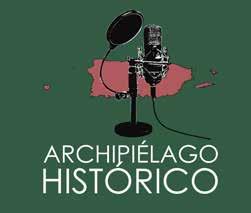

En los años posteriores a la Segunda Guerra Mundial, señala
Immerwahr, Estados Unidos se alejó del colonialismo. En su lugar, puso en práctica las innovaciones en electrónica, transporte y cultura, ideando un nuevo tipo de influencia que no requería el control de las colonias.
Con una gran cantidad de viñetas absorbentes, llenas de sorpresas, e impulsado por una concepción original de lo que significan el imperio y la globalización hoy en día, ‘Cómo ocultar un imperio’ es una obra de historia importante y de lectura compulsiva.

DANIEL IMMERWAHR. Historiador, profesor y director del Departamento de Historia de la Universidad Northwestern. Doctorado en historia en la Universidad de California, Berkeley. Su tesis ganó el Premio Allan Nevins de Historia Económica Americana de la Asociación de Historia Económica, y recibió una mención honorífica para el Premio Betty M. Unterberger de la Sociedad de Historiadores de las Relaciones Exteriores Americanas. Su primer libro, Thinking Small (Harvard, 2015), ganó el Premio Merle Curti de Historia Intelectual de la Organización de Historiadores Americanos y fue el co-ganador del Premio Anual de Libros de la Sociedad de Historia Intelectual de Estados Unidos. En 2015 recibió el premio Stuart L. Bernath Lecture Prize de la Society for Historians of American Foreign Relations.
Whose America? U.S. Immigration Policy since 1980
edited by MARIA CRISTINA GARCIA and MADDALENA MARINARI
Description: A centerpiece of contemporary politics, draconian immigration policies have been long in the making. Maria Cristina Garcia and Maddalena Marinari edit works that examine the post-1980 response of legislation and policy to issues like undocumented immigration, economic shifts, national security, and human rights. Contributors engage with a wide range of ideas, including the effect of the Illegal Immigration Reform and Immigrant Responsibility Act and other laws on the flow of migrants and forms of entry; the impact of neoliberalism and post-Cold War political realignment; the complexities of policing and border enforcement; and the experiences of immigrant groups in communities across the United States. Up-to-date yet rooted in history, Whose America? provides a sophisticated account of recent immigration policy while mapping the ideological struggle to answer an essential question: which people have the right to make America their home or refuge?
Contributors: Leisy Abrego, Carl Bon Tempo, Julio Capo, Jr., Carly Goodman, Julia Rose Kraut, Monique Laney, Carl Lindskoog, Yael Schacher, and Elliott Young
About the Authors: Maria Cristina Garcia is the Howard A. Newman Professor of American Studies at Cornell University. She is the author of The Refugee Challenge in Post-Cold War America Maddalena Marinari is an associate professor in history; gender, women, and
sexuality studies; and peace studies at Gustavus Adolphus College. She is the author of Unwanted: Italian and Jewish Mobilization against Restrictive Immigration Laws, 1882–1965. Garcia and Marinari are two of the coeditors of A Nation of Immigrants Reconsidered: US Society in an Age of Restriction, 1924–1965.
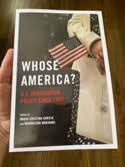
14 El Sol Latino September 2023
Libros / Books
Cómo ocultar un imperio: Historia de las colonias de ESTADOS UNIDOS
por DANIEL IMMERWAHR
Un podcast sobre la historia del archipiélago de Puerto Rico y el Caribe Conversaciones con expertos sobre el tema
y personalidades de interés. Con
el historiador público Ramón A. González-Arango López. ¡Nuevo episodio todos los jueves! ¡Comparte y disfrútalo!
Finanzas / Finances
Relieving or Reliving Credit Card Debt

by
MILAGROS S. JOHNSON
Recently the Federal Reserve Bank announced that Americans have accumulated $1.03 trillion in credit card debt, all while mortgage rates, food and utility prices continue to increase. Consumers are either drowning in debt or struggling to stay afloat.
A balance transfer and debt consolidation loan are thought to be quick and easy way out of debt because you’re converting multiple debts into one. With balances carrying a high Annual Percentage Rate (APR), it may be financially beneficial but they both require commitment and discipline, and come with penalties if you default. When this happens, it ends up costing you more, much more.
Most, if not all, balance transfers offer zero-percent or very lowinterest rate for a specific period of time. In other words, you pay no or a low interest rate during a fixed period, but the total amount borrowed must be paid in full within the limited time allowed. This is similar to a purchase made on a deferred payment plan. The same goes with a debt consolidation loan.
In other words, if you fail to meet the terms of the agreement, you will have to pay the higher interest rate accrued from the beginning of the balance transfer. In addition, with a balance transfer loan, it requires you to pay a balance transfer fee based on the percentage of the amount you are transferring, or a fixed amount set by the lender, whichever is more.
The commitment and discipline it will take of you when taking advantage of a balance transfer offer or debt consolidation loan are:
1) not using the credit cards again to avoid new debt
2) making sure you make monthly payments to avoid defaulting
Salud / Health
por MANUEL FRAU-RAMOS
El Latino Counseling Center inauguró el pasado 8 de agosto 2023 su nuevo centro de servicios de consejería bilingüe en la calle State 121 en el centro de la ciudad de Springfield. La organización, de dueños Latinos, compró y ocupará el espacio de lo que fue las oficinas principales de la reconocida firma de abogados Ross & Ross Law Offices, P.C.
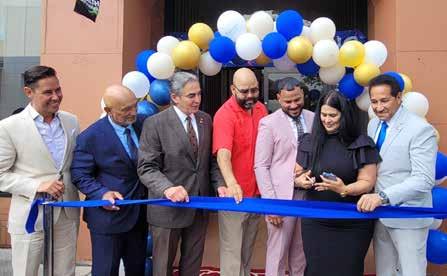
Con la apertura de la nueva sede el Latino Counseling Center marca una nueva etapa de crecimiento que se inicio en el 2018. Desde entonces el centro ha estado llenado la necesidad de servicios bilingüe, en Inglés y Español, de salud mental a los residentes del área metropolitana de Springfield.
La apertura de la oficina en el centro ampliara la capacidad de ofrecer los servicios de la agencia a una cantidad mayor de (CLIENTES). De acuerdo al Presidente y CEO de la organización
Jonathan Alicea la agencia mantendrá abierta las puertas de su oficina en la calle Liberty.
Latino Counseling Center ofrece una amplia oferta de servicios entre ellos ofrece evaluaciones y servicios psicológicos; asesoramiento individual, de pareja y de grupo; y servicios ambulatorios. Además, el centro ofrece programas de salud conductual infantil durante todo el año, que incluyen terapia a domicilio y tutoría en equipo.
3) ensuring you pay off the entire balance by the due date
Here’s a tip to determine on how much you need to pay each month to avoid defaulting before the end of the term. You need to divide the amount of the loan by the number of months of the term of the loan, i.e. ($2,050 with fees, divided by 12-month term = $170.83/month). And, remember to mark the important date on your calendar so you don’t default.
If you’re having difficulty meeting your monthly financial obligations consider getting support from a non-profit debt consolidation counselor (visit www.cfpb.com for their listing). Also, contact your creditors to ask for assistance in lowering your payments.
Here’s a final note. Setting a budget is always helpful, as it gives you a clear picture of your monthly financial obligations. Having a set weekly, biweekly or monthly payment schedule will allow you to stay focused and, hopefully, sleep better. For more information, or to speak with a Consumer Specialist, call (413) 787-6437 or email us at moci@springfieldcityhall.com.
MILAGROS S. JOHNSON is the Director of the Mayor’s Office of Consumer Information in Springfield, a Local Consumer Program funded by the Massachusetts Attorney General’s Office.
15 El Sol Latino September 2023
Izquierda a derecha: Senador Jacob R. Oliveira, José Claudio del New North Citizens’ Council, el alcalde de Springfield Domenic J. Sarno, Senador Adam Gómez, Jonathan Alicea, presidente y CEO de Latino Counseling Center, María Silva, directora financiera de la agencia y el Representante Carlos González (Foto corteísa por Lisandra Rosario).
Puerto Rico y República Dominicana 2023

Holyoke Old Timers Softball League •Agosto 26, 2023






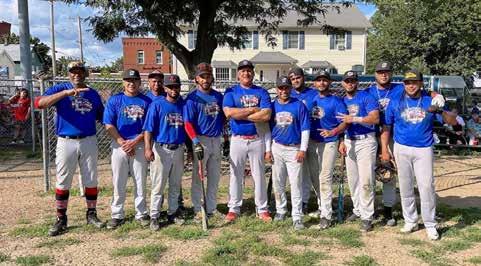
16 El Sol Latino September 2023 Deportes / Sports
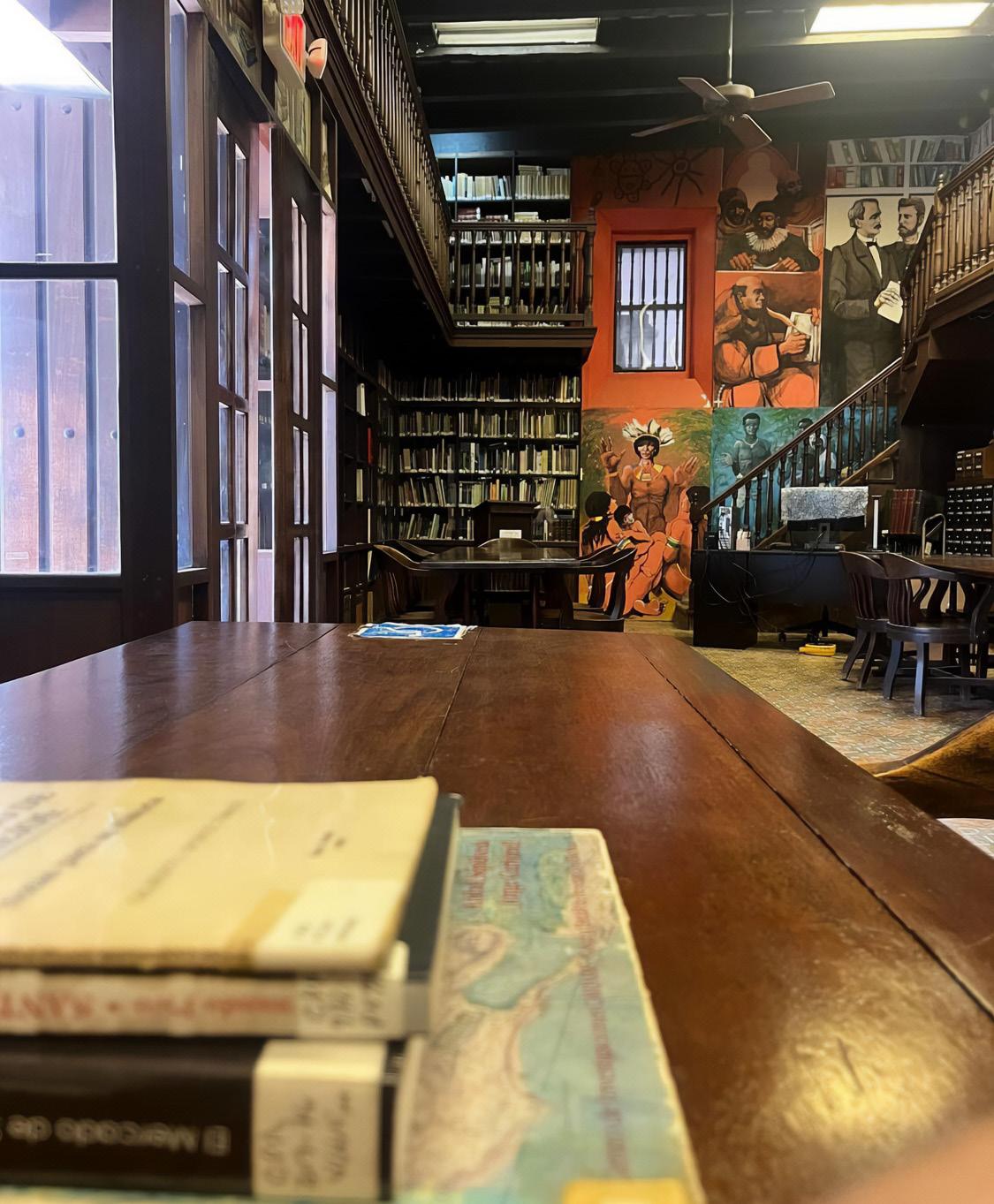









❘
Municipio Autónomo Guayama, Puerto Rico
❘
❘ ❘ ❘ ❘


































































